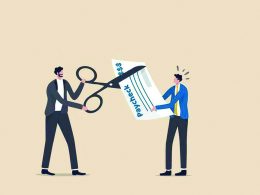The question of banks writing off mortgage debt of householders unable to pay has hit the headlines in the past weeks. Bank of Ireland, AIB and Bank of Scotland have stated they are considering some form of debt write-off. Ireland’s debt crisis is a major burden on the banks and the Irish economy. As part of their recent bank stress test the Central Bank estimated €9.5 billion in bad mortgage debts in the Irish banks between now and 2013. The high level of personal debt is adding to the economy’s deflationary spiral.
Ireland’s personal debt crisis has been caused by the massive extension of credit by financial institutions followed by the rise in unemployment and reduced incomes in the recession. A recent study by the Irish League of Credit Unions shows that 210,000 people are unable to pay their essential bills each month. After paying these bills 245,000 have no money remaining and 735,000 have only €70 left. There are 110,000 households in arrears on their electricity and gas bills. 150,000 have entered into payment arrangements with the ESB, while 2,500 are cut off each month for non-payment.
The debt crisis is most stark when the mortgage debt is examined. There are now over 45,000 mortgages in arrears of over three months – this is 6% of all mortgages. The total amount of money owed in arrears is now over €650 million. Not included in the arrears figure are the 40,000 mortgages that have been restructured in some way – usually payment breaks, interest only payments and term extensions.
The recent rise in the ECB interest rate is the first of a number of rises expected this year. Due to on-going losses, the banks are also expected to increase their rates this year. Given the low level of disposable income the numbers of households falling into difficulty with mortgage payments is set to rise dramatically in the coming months.
It is estimated that as many as 300,000 households are in negative equity. This is where they owe more money in a mortgage than the property is worth. The level of negative equity could reach half of all mortgages as property prices continue to fall. Those most harshly hit by negative equity are young workers who bought their homes at the peak of the housing bubble and have been hit hard with unemployment and attacks on pay.
The banks have advanced the Code of Conduct on Mortgage Arrears which outlines limitations on eviction and a range of forbearance measures such as interest only payments. This is not a solution. Putting the debt crisis “on the long finger” will not solve the problem.
The Socialist Party stands for the balances on all mortgages on domestic homes to be reduced to current house prices. Repossessions on domestic homes should be outlawed. Interest rates should be affordable and not increased to make profits or offset bank debt.
Many right-wing media commentators have attacked the idea of a write-off for those in negative equity. They try to turn one section of mortgage holders against another. We do not accept that the taxpayer or the ordinary bank customer should take the hit for a write-off. The banks and property speculators should take the hit for the inflated mortgages they foisted on working people. Money does not evaporate, it merely changes hands. There were billions made in profits from the property boom. Those profits should be ruthlessly pursued and used to fund the write-off of mortgage debt.
The mortgage debt crisis exposes the rottenness that lies at the heart of capitalism. Essential needs such as housing are left to the market system resulting in super profits for banks and speculators while workers and the unemployed are made pay. There is a housing crisis in Ireland. It is obscene that there are 120,000 homes in 2,800 ghost estates and at the same time there are 120,000 families on local authority housing waiting lists. The market has failed and is unable to provide for our housing needs. The Socialist Party stands for removing the profit motive and for the democratic ownership and planning of housing in the interests of the needs of people and communities.











